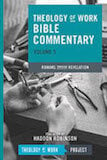Work and Faith: Positive Gratitude, Philippians 1 (Sermon Notes)
Sermon Notes / Produced by The High Calling
Introduction/Hook:
Experts from all walks of life emphasize the value of a positive attitude at work:
“I am convinced that attitude is the key to success or failure in almost any of life’s endeavors.” – Caroline Warner, influential corporate advisor
“Your attitude in the workplace can be one of the most—if not the most—telling aspect of how others in the company look at you and feel about you as a coworker.” – Carl Mueller, popular business writer
“Attitude is more important than the past, than education, than money, than circumstances, than what people do or say. It is more important than appearance, giftedness, or skill.” – Charles Swindoll, leading pastor and author
“If you aren’t fired with enthusiasm, you will be fired with enthusiasm.” – Vince Lombardi, famed football coach [1]
“Employers value ‘positive attitude’ over degree” – Headline of article summarizing recent survey of 735 British firms [2]
The importance of attitude is great news if you’re naturally inclined to feel positively about the challenges of your workplace. But how can you get a positive attitude if you don’t already have one? And what if your situation at work is distressing? If things around you are consistently negative, how can you be expected to have a positive attitude?
Moreover, what does any of this talk about positive attitude have to do with Christian faith? How can being a Christian impact your attitude at work?
What Is a Positive Attitude?
“Attitude” = “a mental position with regard to a fact or state; a feeling or emotion toward a fact or state” (Merriam-Webster Online Dictionary).[3] Attitude has to do with how we respond to the challenges, opportunities, and frustrations of our work. One who has a positive attitude thinks, feels, and acts in encouraging, helpful, and hopeful ways, whether circumstances are positive or negative. A person with a positive attitude doesn’t complain or quit, but offers a new perspective and looks for solutions. [4]
A. Paul: An Example of a Positive Attitude
We find in the Apostle Paul a compelling example of a positive attitude. When he wrote his letter to the Philippians, though he was suffering the indignity and discomfort of imprisonment (Philippians 1:13-14), he was full of joy and encouraged the Philippians to rejoice along with him. In fact, Paul speaks of joy more in Philippians than in any other of his letters, even though it’s one of the shorter letters (16 instances in the epistle of chara [joy] or a form of chairo [to rejoice]).
Sometimes when we’re going through hard times at work, we feel almost entitled to our bad attitude. Yet the example of Paul in Philippians shows that a positive attitude is possible even in the midst of daunting challenges and frustrating limitations. What enabled Paul to have such a positive attitude while he was in prison?
B. Gratitude for Past, Present, and Future
Gratitude helped Paul to remain positive in the midst of his imprisonment. In fact, he puts gratitude front and center in his letter to the Philippians:
(3) I thank my God every time I remember you, (4) constantly praying with joy in every one of my prayers for all of you, (5) because of your sharing in the gospel from the first day until now. (6) I am confident of this, that the one who began a good work among you will bring it to completion by the day of Jesus Christ. (Philippians 1:3-6)
Gratitude for past and present. Paul remembers how the Philippians received God’s grace and became his partners in the work of the gospel. (See also Philippians 4:15-16.) They continue to share in his work “until now,” for which Paul rejoices.
Gratitude for the future. English translations separate verse 6 from 3-5. In fact, it is one sentence in the Greek original. Paul thanks God, not only for what has already happened, but also for what God will do with the Philippians. In “the day of Jesus Christ,” when Christ returns and his kingdom is fully established, God will complete the “good work” he began among the Philippians. Paul’s labors with them will not have been in vain.
C. Gratitude Even in Hard Times
In writing to the Philippians, Paul exemplifies gratitude even in hard times. He encourages us to follow his lead:
(6) Do not worry about anything, but in everything by prayer and supplication with thanksgiving let your requests be made known to God. (7) And the peace of God, which surpasses all understanding, will guard your hearts and your minds in Christ Jesus [emphasis added]. (Philippians 4:6–7)
Life is filled with lots of reasons to worry. Surely this was true for Paul as he sat bound in prison. But we will know the miraculous peace of God that sets us free from worry if we pray “with thanksgiving.” Gratitude enables us to ask with confidence, even as it opens our hearts to receive God’s peace.
Gratitude does not mean that we deny life’s difficulties. It isn’t pretending that everything is wonderful. Rather, gratitude focuses on and highlights what’s good, giving credit where credit is due: to God.
D. The Impact of Gratitude
Gratitude helps us have a positive attitude in our workplace. One might say a positive attitude is a result of positive gratitude. Giving thanks helps us remember what God has done in the past. It reminds us that God is in ultimate control of our lives. It protects our souls from bitterness and self-pity. It opens our hearts to the peace of God.
Paul’s positive gratitude helped him rejoice in his imprisonment. It helped him see how his imprisonment aided the spread of the gospel (Philippians 1:12-14). Thus Paul demonstrated the truth affirmed by popular author and motivational speaker Zig Ziglar: “Of all the ‘attitudes’ we can acquire, surely the attitude of gratitude is the most important and most life-changing.”
Illustration: This would be a good place for you to include an example from your own work experience. If you have time, you might add an example of a person in your church. During my sixteen years as Senior Pastor of Irvine Presbyterian Church, I sometimes thought I had the greatest job in the world. It was easy to be thankful when my job was studying or preaching God’s Word.
But then there were other times, times when I faced a mounting pile of administrative duties, or when I had to deal with people’s criticisms. I could easily begin to lose my positive attitude about my work, becoming mired in discouragement and complaining.
In those times, I tried to get away from church for a few hours to pray. A substantial chunk of my prayer time was filled with gratitude. I thanked God for his work in my life, for my church and family, and for all the ways he was blessing me. I thanked him for the challenges before me and how they forced me to rely more on him. I tried to follow Paul’s advice closely, marinating my supplications in thanksgiving.
By the end of these prayer sessions, my circumstances hadn’t changed. But my attitude had! I knew more of God’s peace. I had greater confidence in God’s gracious care of my life and church. I knew that God would be working in all things for good (Rom. 8:28). Gratitude even helped me see the people who bugged me in a new light, and my problems as opportunities for God’s Spirit to work.
Conclusion
Having a good attitude at work isn’t something you either have by nature or else. It doesn’t begin with wishful thinking or exaggerated self-talk. And it isn’t based on naïve optimism that ignores real problems.
A positive attitude begins with gratitude, as we remember God’s good gifts in the past and look forward to what he’ll do in the future. Gratitude, which flows easily in good times, also comes in hard times as we bring our needs before God with thanksgiving. Gratitude changes our feelings about our work, helping us receive God’s peace and perspective. It enables us to see our challenges with fresh vision and to communicate with hopefulness to our colleagues.
Giving thanks to God sets us free to do exactly what Paul urges near the close of his Philippian letter:
“Rejoice in the Lord always; again I will say, Rejoice” (Philippians 4:4).
Mark D. Roberts, as Senior Director and Scholar-in-Residence for Laity Lodge, is an advisor and frequent contributor to TheHighCalling.org where he writes the daily devotion. A Presbyterian pastor, Mark earned his Ph.D. in New Testament from Harvard University. He has written six books, including No Holds Barred: Wrestling with God in Prayer (WaterBrook, 2005). He blogs daily at www.markdroberts.com.
Click here to download this sermon as a PDF.
Other sermons in this series on Work and Faith:











